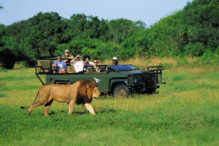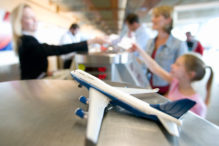Safari Travel Tips
Before stepping on that plane for a marvelous safari adventure, plan like there’s no tomorrow. You will thank your self for being precautious when faced with untoward incidents.
Here are the important things you should consider when going on a safari travel:
1. Remember that it is one challenging endeavor.
Planning a safari can be one of the most exciting feats one can ever manage to make happen. It is not one of the generic travels, usual jetsetters indulge in. Though you are provided with a tour brochure and a tourist guide, it still is better to research on your own regarding the various itineraries.
2. Best spots for safari should be spotted.
The most suggested parts of Africa to enjoy safari include East and Central Africa, Southern Africa and Indian Ocean Islands.
3. Prepare for the climate.
It is a must to know the seasonal trends and how they will affect your travel. But also remember that the weather is fickle-minded so you can never really accurately predict the outcome of your travel if you will base it one the weather alone.
If you are going to visit East and Central Africa, long rains start early in April to early June. Short rains abound during late November to December.
Southern Africa has its rainy season from late November through mid-April for the safari areas. However, during that time, it will be summer in Southern Cape.
When one prefers Indian and Ocean Islands he or she can expect the seasonal trend to be more like of that of Southern Africa. In these islands, summer rains last from November through April. Cyclones can also be experienced during those seasons. From May to October, the dry season occurs.
4. Choose your activities.
Among others, safari traveling offers these fun-filled activities:
a. gorilla trekking
b. sailing
c. birdwatching
d. participatory camping
e. self driving
5. Know what you can afford.
When choosing a trip, budget constraints should never be overlooked. Decide on a price range that you can work on. To make your budgeting more effective consider the level of luxury of your safari travel, length of your trip, activities, accommodations preferences, meals and season.
6. Determine your travel style.
Do you prefer your safari to be more luxurious, moderate or rustic? Will you let kids tag along? Are you traveling with a group or will you be one bold, independent traveler? Will you travel by air or road? What about your guide and your vehicle?
Answering those questions will more or less improve your overview of your dream safari travel.
Have fun!
Travel Tips to European Countries: Germany
About the country
The Federal republic of Germany is the most influential country of Europe. It has witnessed the most controversial facts of history like Nazism, Holy Roman Empire and the building and demolition of the Berlin wall. With many magnificent castles it has wealth of art and culture. German is the widely spoken language in German, but outsiders can find many English speaking locals especially in the common tourist destinations.
Weather
The weather here is very unpredictable as there is a possibility of rain almost all months, so carry clothes accordingly. April and May are the months of spring which brings in full bloom of fruits and flowers. Months from May to September have very fine weather with sunny skies and offers the best time for traveling and site-seeing. People who have a passion for sports like swimming, hiking, and cycling can have the best time here during these months. Winter sports can be enjoyed at the resorts in the months from November to early March. The temperatures are below freezing and the days are too short (comprise of only six to eight months) in winter.
Local Customs
Locals greet each other by handshaking and saying Guten Tag. To say goodbye, people use Auf Wiedersehen. Guests are expected to bring uncovered and odd number of flowers, especially roses, when visiting someone’s home. The guests are welcomed with either food or refreshments. At the table, hosts say ‘Guten Appetit’ to which the guests should reply with ‘Ebenfalls’. Smoking should be better avoided in public areas. Locals dress informally but certain occasions like opera, theatre, certain restaurants and social functions call for formal wear.
Electricity
220 V, 50 Hz
Moving Around
The best way to get around is to buy the Welcome cards or the city passes which allows the customer to access unlimited bus facility in many cities of Germany. It also gives special offer on certain tourist attractions. For flexibility one can rent-a-car or go for chauffer driven cars. Along with the rent, VAT of 16% is payable. Car insurance should be available before hand in case of any accident. The speed limit within the cities is mostly 50kph and 100kph on the highways.
Nine stars
The nine stars of Southwest Germany comprise of Baden-Baden, Freiburg, Heidelberg, Karlsruhe, Heilbronn, Mannheim, Pforzheim Stuttgart, and Ulm. They are considered to be some of the beautiful cities of Europe. Each of the cities play a vital role in the culture of Germany. Baden-Baden has few of the finest resorts and also has Europe’s second largest opera and concert hall. Freiburg is known as the historic city center and is famous for cobblestone mosiacs, open streams and ancient alleys. Heidelberg has world famous castles and Germany’s oldest university. Karlsruhe has the famous museum Center for Art and Media. Look out for various amusements along the Nectar river of Heilbronn. Pforzheim is the capital for watches and jewelry. Stuttgart is famous for theatres and opera. Ulm is the birth place of Albert Einstein and is also house to the world’s tallest hurch spire.
Travel
The national airline that serves Germany is Lufthansa. Bwelin-Tegel airport is situated at 8 km away from the city and it takes about 20 minutes to reach there. There is a provision of duty free shops, banks, post office, eateries, conference hall, and car hire and tourism information for the passengers.
Another busy airport is the Frankfurt airport which is located at 13km away from the city. Buses take about 20 minutes to get there. Taxis are available at any time. The Intercity railway network at the airport also provides international services to Hungary, Switzerland and Austria. The facilities provided here are duty free shops, left luggage, restaurants, banks, conference halls, post office, car hire and tourism information. No departure tax is levied on the passengers.
Those wishing to travel by sea can avail the ferry connections to Finland, Lithuania, The Netherlands, Latvia, and Norway.
Eurostar provides railway service to and from Belgium, France and the UK. Booking can be made by telephone. The Inter-Rail offers unlimited second class train travel within 29 European countries. The Eurailpass offers unlimited first class train travel within 17 European countries.
EuroCity and InterCity trains have a restaurant on board, providing food and drinks. InterCity Express target the business class and provides services such as fully equipped office, conference compartments, etc. Tourist over 17 years of age can carry alcohol and tobacco with them within permissible limits.
7 Killer Ways To Beat Jet Lag
When you’re headed out on a vacation or business trip the last thing you need is to feel tired or run down. But with these seven tips to beat jet lag, you’re sure to stay alert and ready for your entire trip.
Keep it the same
When you’re not traveling for long, you can usually avoid jet lag by sticking to your normal routine. Keep your watch set to your ‘home’ time and just do what you’d normally do at home—eating, sleeping, exercise, etc.
Your body won’t even notice the time chance when you do this, and it will readjust without any problems on the way back.
Sleep like a baby
When you’re traveling out of your normal time zone, you’ll want to try to keep to normal bedtimes. And while you might have troubles at first, try to get the same number of hours of sleep per night. This will help your body fall into a new rhythm for the time when you’re away.
Even if you can’t fall asleep right away, try to get into bed and close your eyes until you fall asleep. Eventually your body will pick up the clue and you’ll get all the sleep that you need.
Fill yourself up
Many times jet lag can be made worse by becoming dehydrated on your trip or while you’re headed there on the plane. To combat this you’ll want to make sure that you’re drinking plenty of fluids as you travel—water and juices especially.
Alcohol can dehydrate the body so it should be avoided if you can. And if you’re expected to drink at a business function, just follow each glass with a chaser of water.
Find the rhythm
When you’re headed into areas where the time will change significantly, you want to set your watch when you get there and start following the local hours. You’ll want to eat when you are supposed to eat, sleep when it’s dark, etc.
By changing the routine that you’re used to directly into the new hours, you can help to offset jet lag before it even starts. Follow your new daylight and darkness hours to adjust your circadian rhythms.
When you arrive
One of the best ways to avoid jet lag is to do some form of exercise when you arrive at your destination. This can be as simple as a walk or a few calisthenics in your hotel room. Do a few jumping jacks to get your heart pumping or start touring the town.
When your body gets exercise, it can ‘bank’ the extra energy and help you adapt to changing light conditions.
If you just can’t sleep
When all else fails, you can try a sleeping pill to re-teach your body when to sleep. Normally this isn’t recommended, but when you’re on an extended trip or you have to switch time zones frequently, a sleeping pill can help to give you some rest in order to be alert during the day.
Natural cues
And if the sleeping pill doesn’t appeal to you, you can try aromatherapy.
Find a good travel kits that includes oils that you can smell for energy as well as soothing oils for relaxation, like lavender.
With all of these tips, jet lag will no longer follow you on your next trip.
7 Tips For Successful Travel
We all travel a lot more now than our ancestors did. We travel all over the world and only think of the jet lag, and not the vast distances we cover. Our world has become smaller and more reachable. And this is a good thing. It helps us to understand different cultures, different people with different ways of living and working. But there are a few essentials you should always check before setting off.
1. It may seem obvious, but many people don’t bother to find out the most basic things about the country they will travel to. You should do this to avoid surprise or disappointment.
2. Check on the kind of weather you will find where you are going. If you live in Florida and travel to northern Greenland, you will be in for a shock unless you know that much colder weather is normal there.
3. Be sure that the medical and general insurance coverage you have (you do have, don’t you?) is adequate for your destination.
4. Do you have all the paperwork and documentation required for your trip? If not, get it!
5. Are there any diseases you will need immunization against where you are going? Check and find out before getting exposed.
6. If you plan on driving in the place you intend to travel to, check that you have an acceptable licence. You may need an international driving licence, for example. And are you familiar with the local driving laws where you are going? If not, become familiar, fast.
7. Finally, the most obvious one of all: is your passport up to date? And if not, do you have enough time to renew it before you set off? You’d be surprised, amazed even, at how many people get this one wrong.






